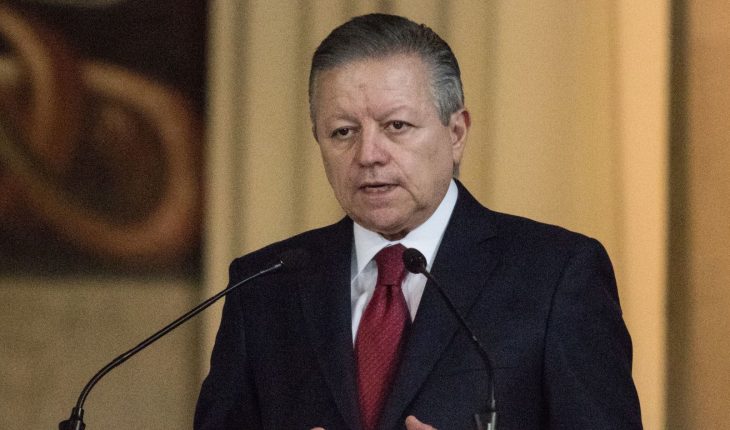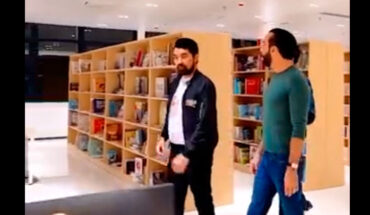Opposition deputies in Congress, with the support of some legislators from Morena, will extend the action of unconstitutionality that they are preparing against the new Organic Law of the Judiciary, to attack not only the extension of the mandate for two more years of the Minister President of the Court, Arturo Zaldivar, but other provisions that they consider to violate the independence and autonomy of the judges.
You may be interested: Arturo Zaldívar rushes the SCJN to give a position on reform that extends his mandate
Among the points that will be included in the action, said legislators participating in the procedure, is related to the power that the president of the Court would have to move and change secondment judges; the new mechanisms established for the evaluation of judges and the rules for suspending them; the concentration of cases in the figure of the head of the Judiciary, among others.
“The consensus is that undoubtedly a very important part has to do with the transitional article 13 (which extends from 2022 to 2024 the presidency of Zaldívar), but we have also considered the possibility of other issues that have to do with judicial independence and autonomy. These are very important issues that have to be reviewed under the Constitution,” said Citizen Movement deputy Martha Tagle.
In an interview with Animal Politico, the legislator explained that the new points that will be included in the action of unconstitutionality are the result of the analysis tables of a seminar that for four weeks have been held with experts and civil society organizations on this issue.
Tagle said that they have already gathered the 167 signatures that were required to support this action against the so-called “Zaldivar Law,” so it will be formally presented to the Supreme Court of Justice of the Nation before July 10. What is missing is the updating and verification of some of the signatures and finish refining the content of the resource.
Among the signatories of this action are opposition deputies grouped together with the so-called “containment bloc” that have integrated the PAN, PRI, PRD, and Citizen Movement, but which will also be joined by morena legislators such as deputies Laura Villavicencio and Porfirio Munoz Ledo.
In addition to the action of unconstitutionality that the deputies are preparing, in the Senate they are also preparing to file an appeal on their own. Other actors that could also present these actions are the National Human Rights Commission and the Attorney General’s Office (FGR), although these institutions have not announced their intention to do so.
What about Zaldivar’s query?
Last Monday, The Minister President of the Court, Arturo Zaldivar, officially presented to his colleagues an appeal for extraordinary consultation in order to evaluate whether through this mechanism it can be reviewed whether or not the two-year extension endorsed in the judicial reform is unconstitutional, and whether this means is the right way to deal with a matter of this nature. This is in addition to clarifying what the procedure would be.
The request for consultation was turned over to the presentation of Minister José Fernando Franco Salas (the most experienced among the ministers), who will be responsible for preparing the project that responds to this request, to be submitted for consideration by his colleagues at an upcoming date.
Although Zaldivar argued that the consultation he is proposing will be resolved more quickly than an action of unconstitutionality, the deputies decided that they will continue with the elaboration of the aforementioned constitutional control appeal, since they consider that it is the appropriate mechanism to evaluate in depth not only the extension of his mandate, but various aspects of the judicial reform.
“We recognize Zaldivar’s disposition, but consultation is not the ideal means to resolve the unconstitutionality of the rule. And it seems to us that it is necessary to analyze the substance of the judicial reform, which are also transcendental and have been overshadowed by the issue of the transitional period. That is why the action of unconstitutionality is the appropriate remedy for it,” said Deputy Tagle.
The legislator added that another important factor for having opted for the presentation of the action is that the effects of the consultation proposed by Zaldivar are not clear. That is to say, even if it were decided from that consultation that the two-year extension of his term is not appropriate, it is not clear how that would actually land.
Read more: Opponents may still dissatisfie with reform and extension of Zaldivar’s mandate: AMLO
Experts privilege action over consultation
Experts in constitutional law consulted by this means agreed in the need for the judicial reform to be reviewed through an action of constitutionality, regardless of the result of the extraordinary consultation that Minister Franco will resolve.
Juan Jesus Garza Onofre, a researcher at the UNAM’s Institute of Legal Research, warned that privileging only consultation can even be dangerous because it is a procedure that has no rules – unlike an action of unconstitutionality – and that because of this could be handled at the convenience of a particular interest.
“It is strange how things have been presented and the position of Minister Zaldivar himself who had initially said that he would excuse himself from all the analysis, but then changed his mind on the subject of the consultation. It had also been said that only the vote of 6 ministers was enough for the consultation, but then it was mentioned that it was not. I think it is clear that something is changing in the Court and therefore it is better to intervene the actions of unconstitutionality that are the ones that can give us certainty,” he said.
The UNAM researcher also insisted on the importance of having several aspects of a judicial reform reviewed through the action presented by the legislators, which on the one hand generates doubts about the concentration of powers in the figure of the president of the Court, and on the other hand, fell short on issues such as the strengthening of the Public Defender’s Office.
Javier Martin Reyes, professor and researcher at the Center for Economic Research and Teaching (CIDE), agreed with the legislators who promote the action of unconstitutionality regarding the lack of clarity of the scope of the consultation promoted by Zaldivar and the application of the result, whatever it may be.
“The action of unconstitutionality has the advantage that it allows a direct contrast between the constitution and a secondary law and if it is determined with a qualified majority of eight ministers that there is violation that rule or article is expelled. The result is clear,” the specialist said.
The good news that Martin Reyes pointed out regarding the consultation is that it has taken turns to Minister Franco, who has been consistent in his position of autonomy from the Judiciary and who has previously shown his position against the extension of the mandate in the positions, as was the case of the project that he elaborated on the expansion that the governor of Baja California, Jaime Bonilla, was seeking.
“But even so, the problems persist because although there are those who say that through consultation this transitory that is clearly contrary to the Constitution could be invalidated, this would go far beyond the scope of this figure. There are many questions and this only underscores the imperative need for actions of unconstitutionality to be filed,” Reyes concluded.
What we do at Animal Politico requires professional journalists, teamwork, dialogue with readers and something very important: independence. You can help us continue. Be part of the team.
Subscribe to Animal Politico, receive benefits and support free journalism.#YoSoyAnimal





